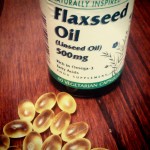 Humans require two essential fatty acids, alpha linolenic acid and linoleic acid. These fatty acids are essential because they are metabolised to important cellular signal molecules called eicosanoids. Alpha linolenic acid belongs to the omega 3 family of fatty acids, while linoleic acid belongs to the omega 6 family of fatty acids. Generally our diets supply too much linoleic acid (omega 6) and not enough alpha linolenic acid (omega 3). This is because dietary sources of omega 3 oils are limited, while sources of omega 6 oils are plentiful. As a result the current ratio of omega 6 to omega 3 fats in the modern Western diet may be as high as 10 to 1, whereas the beneficial ratio should be closer to to 3 to 1. The resulting imbalance to the omega 6 to omega 3 the ratio detrimentally alters the production of eicosanoids which can increase cellular inflammation and induce disease. Many have become aware of the inability of the Western diet to supply adequate omega 3 fatty acids, and in response supplements of omega 3 fatty acids have become popular.
Humans require two essential fatty acids, alpha linolenic acid and linoleic acid. These fatty acids are essential because they are metabolised to important cellular signal molecules called eicosanoids. Alpha linolenic acid belongs to the omega 3 family of fatty acids, while linoleic acid belongs to the omega 6 family of fatty acids. Generally our diets supply too much linoleic acid (omega 6) and not enough alpha linolenic acid (omega 3). This is because dietary sources of omega 3 oils are limited, while sources of omega 6 oils are plentiful. As a result the current ratio of omega 6 to omega 3 fats in the modern Western diet may be as high as 10 to 1, whereas the beneficial ratio should be closer to to 3 to 1. The resulting imbalance to the omega 6 to omega 3 the ratio detrimentally alters the production of eicosanoids which can increase cellular inflammation and induce disease. Many have become aware of the inability of the Western diet to supply adequate omega 3 fatty acids, and in response supplements of omega 3 fatty acids have become popular.
The omega 6 fatty acid linoleic acid can be converted to gamma linolenic acid, which in turn can be converted to beneficial anti-inflammatory eicosanoids. However, too much linoleic acid produces arachidonic acid which leads to the formation of cellular inflammation and immune suppression. The correct intake of omega 3 fatty acids is important because their eicosanoids can balance this pro-inflammatory anti-inflammatory seesaw and tip it in favour of a beneficial anti-inflammatory cellular state. Flax seed oil is a rich source of alpha linolenic acid as so is a popular choice to increase omega 3 intakes for this purpose. However, the alpha linolenic acid must be converted to eicosapentaenoic acid and then to omega 3 eicosanoids, before it can influence cellular inflammation. Alpha linolenic acid can be converted enzymatically to eicosapentaenoic acid in humans, and therefore increasing intakes of flaxseed oil should increase cellular levels of eicosapentaenoic acid and decrease inflammation.
Supplementing flax seed oil was popularised by Udo Erasmus in his seminal book, Fats That Heal, Fats That Kill (here). However, the main problem with supplementation with flaxseed oil, is that that evidence shows that the alpha linolenic acid it contains is very poorly converted to eicosapentaenoic acid and so is a poor regulator of the pro-inflammatory anti-inflammatory seesaw. In fact the alpha linolenic acid in flaxseed oil may cause detrimental changes to the eicosanoid pathway because it interferes with the enzyme (delta 6-desaturase: here) that synthesises the gamma linolenic acid required for the anti-inflammatory effects of omega 6 fats. The reason for this is likely genetic, and relates to a widespread deficiency of the enzyme in humans. Because this enzyme is present in only low concentrations in most people, the conversion of alpha linolenic acid to eicosapentaenoic acid is slow (~5 %). However, by supplementing with high intakes of alpha linolenic acid, what little activity in the delta 6-desaturase enzyme present may be inhibited further.
Generally the nutritional literature shows that flaxseed oil may increase plasma levels of eicosapentaenoic acid, but that the increase is small and shows variation between individuals. For example in a recent study1, researchers fed healthy subjects a high flaxseed oil diet or a typical Western diet for 4 weeks each. The high flaxseed oil diet, which contained about 10 % of the intake as alpha linolenic acid, increased the plasma levels of eicosapentaenoic acid compared to the typical Western diet, but only in some individuals. In others, the apparent conversion was decreased. This suggests that the delta 6-desaturase enzyme had been downregulated in these individuals. Indeed when the authors analysed this further they found low eicosapentaenoic acid plasma levels were associated with a particular variant of the delta 6-desaturase gene. It is thought that the majority of people do not convert alpha linolenic acid to eicosapentaenoic acid efficiently and so flaxseed oil may not elevate plasma levels of eicosapentaenoic acid.
This poor conversion of alpha linolenic acid to eicosapentaenoic acid may explain the lack of ability of alpha linolenic acid to reduce cardiovascular disease risk, when compared to fish oils2. Fish oils contain preformed eicosapentaenoic acid, as well as docosahexaenoic acid that is readily converted to eicosapentaenoic acid. This direct supply of eicosapentaenoic and docosahexaenoic acid has three main benefits. Firstly, it bypasses the need for the use of the delta 6-desaturase enzyme and so increases the available enzyme the anti-inflammatory omega 6 eicosanoids. Secondly, the fatty acids in fish oil raise plasma levels of eicosapentaenoic acid to a much higher levels compared to the alpha linolenic acid in flaxseed oil3, thus inhibiting inflammation much more effectively. Thirdly, fish oil raises plasma levels of docosahexaenoic acid, whereas flaxseed oil does not. Docosahexaenoic acid is important because it is converted to docosanoids which have neuropreotective and anti-inflammatory effects.
RdB
